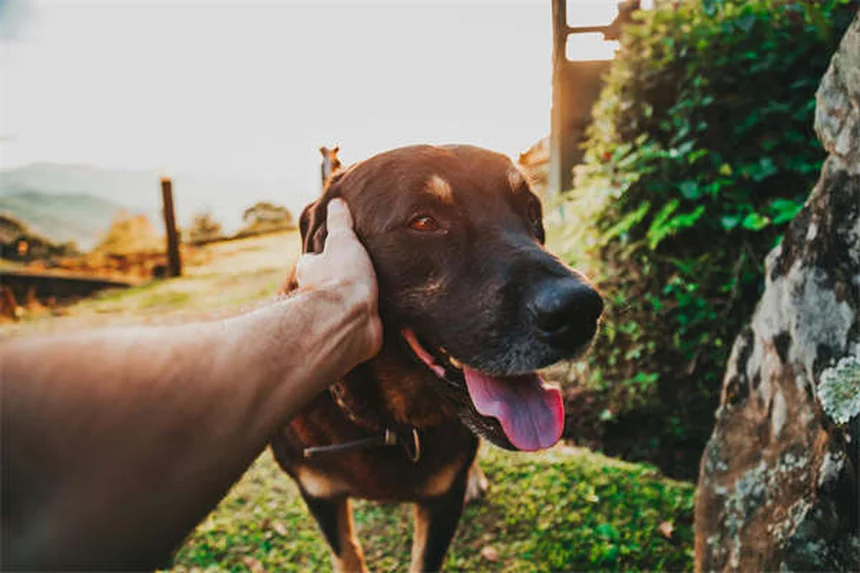Advertisement
What is puppy strangles? Let me break it down for you - it's a scary-looking but treatable condition where your pup's face suddenly swells up like a balloon. The technical name is juvenile cellulitis, but we call it strangles because those swollen lymph nodes make it look like someone's choking your poor puppy!Here's the deal: if you notice sudden facial swelling in your young dog, you need to act fast. While the condition isn't contagious, it can become life-threatening if left untreated. The good news? With proper veterinary care, most puppies bounce back completely within 10-14 days.I've treated dozens of strangles cases in my veterinary practice, and let me tell you - it's always shocking how quickly symptoms appear. One day you've got a perfectly healthy pup, the next they look like they lost a fight with a beehive! That's why I'm sharing everything you need to know to recognize and respond to this condition.We'll cover the 5 unmistakable signs of puppy strangles, why certain breeds are more at risk, and exactly what treatment looks like. Whether you're a new puppy parent or an experienced dog owner, this info could save your furry friend's life!
E.g. :Testicular Tumors in Dogs: Symptoms, Treatment & Prevention
- 1、What Exactly is Puppy Strangles?
- 2、Spotting the Signs of Puppy Strangles
- 3、Why Does Puppy Strangles Happen?
- 4、How Vets Diagnose Puppy Strangles
- 5、Effective Treatment Options
- 6、The Road to Recovery
- 7、Your Burning Questions Answered
- 8、Prevention and Future Outlook
- 9、Beyond the Basics: What Else You Should Know
- 10、When to Sound the Alarm
- 11、The Cost Factor
- 12、Myth Busting Common Misconceptions
- 13、Life After Puppy Strangles
- 14、Your Puppy's Immune System Explained
- 15、When to Get a Second Opinion
- 16、The Puppy Strangles Survival Guide
- 17、FAQs
What Exactly is Puppy Strangles?
The Mystery Behind This Puppy Skin Condition
Ever seen a puppy with a suddenly swollen face that looks like they got into a fight with a beehive? That might be puppy strangles - officially called juvenile cellulitis by vets. It's like your pup's immune system threw a wild party and forgot to clean up afterwards!
This condition hits fast and hard, typically showing up as dramatic facial swelling around the muzzle and eyelids. The lymph nodes in the neck swell up so much it looks like someone's strangling your poor pup (hence the name). Within days, painful pimple-like lesions start oozing and crusting over. If you notice these symptoms, don't wait - this is a veterinary emergency!
Who Gets Puppy Strangles?
While most common in puppies 3 weeks to 6 months old, I've seen cases in dogs up to 4 years old. Some breeds seem more prone to it - Golden Retrievers, Dachshunds, and Gordon Setters top the list. Here's a quick comparison of affected breeds:
| Breed | Relative Risk |
|---|---|
| Golden Retriever | High |
| Dachshund | Moderate |
| Gordon Setter | Moderate |
| Mixed Breed | Low |
Spotting the Signs of Puppy Strangles
 Photos provided by pixabay
Photos provided by pixabay
The Obvious Symptoms You Can't Miss
Picture this: your normally playful pup suddenly looks like they've been crying all night with puffy eyes and a swollen face. That's your first red flag. The swelling comes on fast - we're talking overnight transformation from cute to cartoonish proportions.
Other unmistakable signs include:- Fever that makes your pup feel like a little furnace- Painful skin lesions that look like bad acne- Swollen lymph nodes that feel like marbles under their jaw- Limping from joint inflammation- Complete loss of their usual puppy energy
The Sneaky Symptoms You Might Overlook
While the facial swelling grabs your attention, some symptoms creep up quietly. Your pup might:- Stop eating their favorite treats (big warning sign!)- Drink less water than usual- Develop bald patches where the sores appear- Become super sensitive to touch
Did you know many owners mistake puppy strangles for spider bites at first? I've had clients rush in convinced their pup tangled with a brown recluse, only to discover it's this immune system glitch instead.
Why Does Puppy Strangles Happen?
The Immune System Gone Haywire
Here's the million dollar question: What triggers puppy strangles? The frustrating answer? We don't exactly know. But here's what we do understand - it's like your puppy's immune system freaks out and attacks its own skin.
The condition responds incredibly well to steroids, which basically tell the immune system to chill out. This strongly suggests it's an autoimmune response. Think of it like your pup's body mistakenly identifying its own face as a threat!
 Photos provided by pixabay
Photos provided by pixabay
The Obvious Symptoms You Can't Miss
While any puppy can develop strangles, certain breeds appear more vulnerable. This points to possible genetic factors. If you have a Golden Retriever puppy, for example, you might want to be extra vigilant about sudden facial swelling.
But here's some good news - even if your pup gets strangles once, they typically don't get repeat performances. It's usually a one-time immune system hiccup during their development.
How Vets Diagnose Puppy Strangles
The Initial Examination
When you bring your swollen-faced pup to the clinic, here's what we look for:- Symmetrical swelling (both sides of the face equally affected)- Painful skin lesions that ooze and crust- Fever over 103°F- Enlarged lymph nodes you can feel under the jaw
But wait - how do we know it's not just a bad infection? That's where diagnostic tests come in!
The Tests That Confirm Strangles
We typically run several tests to rule out other conditions:1. Bloodwork to check white blood cell counts2. Skin scrapings to eliminate mange or fungus3. Cytology tests on the oozing lesions4. Sometimes biopsies (though we avoid these when possible)
The classic strangles case shows elevated white blood cells but no actual infection. It's like your pup's body is fighting an invisible enemy!
Effective Treatment Options
 Photos provided by pixabay
Photos provided by pixabay
The Obvious Symptoms You Can't Miss
Here's where things get interesting. The same medications that cause athletes to get banned from competitions can save your puppy's life! High-dose steroids like prednisone are our go-to treatment.
We start with strong doses for 1-2 weeks, then gradually taper down over several weeks. It's crucial not to stop suddenly - that's like slamming the brakes on your immune system at highway speeds!
Supportive Care Matters Too
While steroids do the heavy lifting, we often add:- Antibiotics if secondary infections develop- Pain medication (because those sores hurt!)- Special shampoos for crusty lesions- Nutritional support if they stop eating
Can puppy strangles be fatal? Absolutely - if left untreated. But with proper care, most pups bounce back beautifully. The key is acting fast when you notice symptoms.
The Road to Recovery
What to Expect During Treatment
Most pups show improvement within 48 hours of starting steroids. The swelling goes down first, then the lesions start healing. Full recovery typically takes 10-14 days, though severe cases might take longer.
Here's a pro tip: resist the urge to pop those pimple-like lesions! It's tempting, I know. But popping them can introduce infections and cause more pain. Let them heal naturally.
Possible Long-Term Effects
While most pups recover completely, some may have:- Permanent hair loss in affected areas- Light scarring where lesions were worst- Increased skin sensitivity
The good news? Once they've recovered, they're usually in the clear. Puppy strangles rarely makes an encore appearance!
Your Burning Questions Answered
Is Puppy Strangles Contagious?
Here's a question I get all the time: "Can my other pets catch it?" Nope! Despite the dramatic appearance, puppy strangles isn't contagious to other animals or humans. It's an internal immune system issue, not an infection.
Can It Come Back After Treatment?
Another common concern: "Will my dog get this again?" Typically no. Most dogs who recover from puppy strangles never experience it again. Their immune system seems to figure things out after that initial overreaction.
Prevention and Future Outlook
Can You Prevent Puppy Strangles?
Since we don't fully understand what causes it, prevention is tricky. But keeping your pup generally healthy with:- Quality nutrition- Regular vet checkups- Proper vaccination- Good hygiene
...can't hurt! These measures support overall immune system health.
The Silver Lining
While puppy strangles looks terrifying, the prognosis with treatment is excellent. Most pups make complete recoveries and live perfectly normal lives afterward. The key is recognizing symptoms early and getting veterinary care immediately.
Remember - if your puppy's face suddenly resembles a balloon animal, don't panic but don't wait either. Get to your vet, and chances are your furry friend will be back to normal in no time!
Beyond the Basics: What Else You Should Know
The Emotional Toll on Pet Parents
Let's talk about something vets rarely mention - how heartbreaking it is to see your playful pup suddenly look like they've been through a boxing match. I've had grown men cry in my office when their puppy's face balloons up overnight. It's okay to feel scared - this condition looks way worse than it typically is!
Here's what I tell every worried owner: Your puppy isn't in nearly as much distress as you imagine. While those lesions look painful (and they can be uncomfortable), most pups handle treatment like champs. Within days of starting medication, you'll see that familiar spark return to their eyes.
Home Care Tips While Recovering
When your pup comes home after diagnosis, you'll want to create a comfortable recovery space. Try these pro tips:- Use soft bedding (those sore areas need cushioning)- Keep water fresh and easily accessible- Offer small, frequent meals if appetite is low- Gently clean crusty areas with vet-approved wipes
Ever tried putting a cone on a puppy with facial swelling? It's like trying to fit a square peg in a round hole! Instead, ask your vet about inflatable collars that don't press on swollen areas.
When to Sound the Alarm
Red Flags During Treatment
While most cases respond well to steroids, you should call your vet immediately if you notice:- Increased lethargy after 48 hours of treatment- Refusal to eat for more than one day- New swelling in other body parts- Difficulty breathing (rare but serious)
Did you know some pups develop temporary joint pain with strangles? If your puppy seems stiff or reluctant to move, don't panic - but do mention it to your vet at the next check-in.
Emergency Signs Before Diagnosis
Before you even get to the vet, these symptoms mean drop everything and go now:- Swelling that blocks nostrils or eyes- Collapse or inability to stand- Blue-tinged gums- Seizures (extremely rare)
I once had a Dachshund puppy whose face swelled so much his collar became tight. Moral of the story? Remove collars from swollen-neck pups immediately!
The Cost Factor
What Treatment Might Cost You
Let's talk dollars and sense. A typical puppy strangles case might run:- $200-$400 for initial diagnosis- $50-$150 for medications- $100-$300 for follow-up visits
But here's the kicker - delaying treatment can double or triple these costs if complications arise. Early action saves money and misery!
Insurance Considerations
Good news for pet insurance holders - most plans cover puppy strangles as it's not a pre-existing condition. But read your policy carefully:- Some have waiting periods- Others exclude "immune disorders"- Deductibles still apply
I always recommend getting pet insurance before problems appear. It's like wearing a seatbelt - you hope you never need it, but you'll be glad it's there!
Myth Busting Common Misconceptions
"It's Just Puppy Acne"
Here's a dangerous myth I hear too often. While puppy acne exists, it doesn't cause:- Fever- Extreme swelling- Lethargy- Loss of appetite
If someone tells you to "just wait it out," smile politely and call your vet instead. Puppy strangles won't resolve without treatment!
"My Breed Doesn't Get This"
While certain breeds are more prone, I've seen puppy strangles in:- Tiny Chihuahuas- Giant Great Danes- Tough-looking Pit Bulls- Even hairless Chinese Cresteds!
No breed is completely immune. When it comes to puppy health, it's better to be safe than sorry.
Life After Puppy Strangles
Long-Term Health Outlook
Worried this will affect your pup's future? Take a deep breath - most strangles survivors live completely normal lives. They can:- Compete in dog sports- Become service animals- Have healthy puppies- Live to ripe old ages
The only lasting effect might be a funny story to tell at dog parks about that time Fido's head tripled in size!
When to Consider Breeding
If your pup had strangles, should you breed them later? While we don't know the exact genetic factors, many vets recommend:- Waiting until at least 2 years old- Choosing mates without strangles history- Discussing with your vet first
Remember, just because your dog had strangles doesn't mean they'll pass it on. But why take chances when there are so many healthy pups needing homes?
Your Puppy's Immune System Explained
How Puppy Immunity Develops
Think of your puppy's immune system like a new employee - enthusiastic but prone to overreacting. In the first months of life, their defenses are still learning what's a real threat versus what's harmless.
Sometimes this learning process goes haywire, like an overeager security guard tackling grandma for carrying cough drops. Puppy strangles represents one of these overreactions - scary in the moment, but ultimately a learning experience for their developing system.
Supporting Immune Health Naturally
While you can't prevent strangles, you can support overall puppy immunity with:- High-quality puppy food (no cheap fillers)- Appropriate vaccination schedules- Regular deworming- Moderate exercise- Plenty of sleep
Think of these as giving your pup's immune system a good education - it might still make mistakes, but it'll learn faster!
When to Get a Second Opinion
Signs You Might Need Another Vet
While most vets recognize puppy strangles immediately, consider a second opinion if:- Treatment shows no improvement after 3 days- Your vet seems unfamiliar with the condition- The diagnosis doesn't feel right to you
Trust your gut - you know your puppy best. A good vet won't mind you seeking confirmation!
Finding a Specialist
For complicated cases, veterinary dermatologists are the strangles experts. They can:- Perform advanced testing- Suggest alternative treatments- Provide long-term management plans
But for most straightforward cases, your regular vet has got this. Save the specialist visits for truly puzzling situations!
The Puppy Strangles Survival Guide
Creating Your Emergency Plan
Here's my challenge to you: make a puppy emergency plan today. Know:- Your vet's after-hours number- The nearest 24-hour clinic- Basic pet first aid
Having this info handy could save precious hours if strangles or another emergency strikes at 2 AM on a holiday weekend!
Building Your Support Network
Don't go through puppy health scares alone. Connect with:- Other pet owners in your neighborhood- Online breed-specific groups- Local veterinary school hotlines
You'd be amazed how many strangers will offer advice, support, and even emergency rides to the vet when your pup needs help!
E.g. :Juvenile Cellulitis (Puppy Strangles) | VCA Animal Hospitals
FAQs
Q: How can I tell if my puppy has strangles or just an allergic reaction?
A: Great question! While both conditions cause facial swelling, puppy strangles has some telltale differences. First, look for those painful, oozing skin lesions - allergies typically don't cause these. Second, check for swollen lymph nodes under the jaw (they'll feel like hard marbles). Third, strangles usually comes with fever and lethargy, while allergic pups often remain energetic. When in doubt? Always err on the side of caution and see your vet immediately. I've had cases where owners waited "to see if it gets better," and those pups ended up in critical condition.
Q: Are certain puppy foods or environments more likely to cause strangles?
A: Here's the interesting part - since we believe strangles is an immune system malfunction rather than an environmental reaction, there's no proven link to specific foods or surroundings. That said, I always recommend feeding high-quality puppy food to support overall immune health. Some breeders swear by avoiding stress during key developmental periods, but honestly? We just don't have scientific evidence connecting strangles to diet or environment. It seems to be more about that perfect storm of genetics and immune system development.
Q: Can adult dogs get puppy strangles, or is it strictly a puppy condition?
A: While we call it "puppy" strangles, I've actually treated a few rare cases in young adult dogs up to 4 years old. The vast majority (about 95%) occur in pups between 3 weeks and 6 months old. After that first year, the risk drops dramatically. Think of it like chickenpox in humans - possible to get as an adult, but much more common in childhood. If your adult dog develops similar symptoms, it's more likely to be a different condition that needs veterinary attention.
Q: What's the recovery process like after starting treatment?
A: The turnaround can be pretty dramatic! Most pups I've treated show noticeable improvement within 48 hours of starting steroids. The swelling goes down first, then the lesions start drying up. Full recovery typically takes 10-14 days. During this time, you'll need to follow your vet's tapering schedule for medications - stopping suddenly can cause serious problems. Some pups may need antibiotics if secondary infections developed. Pro tip: Keep recovery photos! It's amazing to compare "before" and "after" shots once your pup is back to normal.
Q: Are there any long-term effects after recovering from puppy strangles?
A: Most pups recover completely with no lasting issues, but there can be some cosmetic changes. About 20% of cases I've seen have permanent hair loss in the affected areas, usually just small patches. Severe cases might have light scarring where the worst lesions were. The important thing to know? These are purely cosmetic - your pup's health and happiness aren't affected long-term. And here's some good news: dogs who've had strangles almost never get it again!







